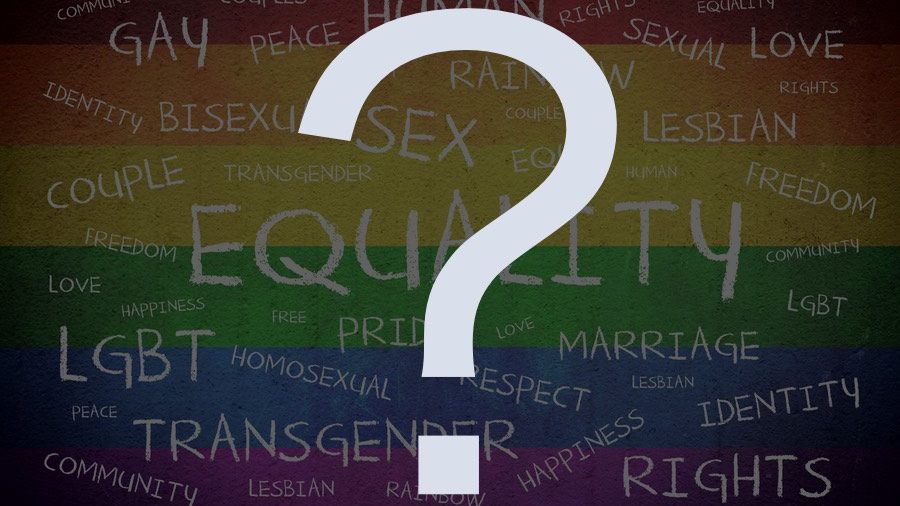By: Tom Gilson – stream.org – June 5, 2018
It only took moments on Monday for LGBT activists to roll out their bogus talking points again. All three appeared like clockwork in MSNBC’s inevitable LGBT reaction story on Monday afternoon.
They aren’t bogus because I disagree with them. They’re bogus because they’re false, irrational, deceitful and manipulative. And yet they have real rhetorical power in the seemingly never-ending debate over sexuality in our society.
”Equality”
The worst of them is the “equality” slogan. MSNBC quoted Rachel B. Tiven, CEO of the LGBT legal group Lambda Legal, saying, “We will continue to fight in every arena and in every court until LGBT people and people living with HIV have full equality under the law in every aspect of our lives.”
This is bogus.
Consider the usual context for the “equality” slogan: “Marriage equality.” I suspect this was the single most influential force leading to the Supreme Court’s gay marriage decision three years ago.
It’s powerful. I could almost admire the strategic savvy it shows. It draws straight from the heart of the American psyche. From the Declaration of Independence to the civil rights battles of the mid to late 20th century, America’s identity is nothing if not one of equality. So the phrase tugs at our souls — but the tug is nothing but a deceitful distraction, a manipulative misdirection. For the marriage debate has never been about equality.
It couldn’t be about equality; at least not equality as the ruling principle, the value that separates LBGT supporters from opponents. Why not? Because everyone believes in marriage equality — and no one believes in “marriage equality.”
Everyone believes in marriage equality up to a certain limiting line, that is, and no one believes in marriage equality beyond some certain limiting line. We disagree on where that line should be. And that is the extent of our disagreement: the limiting line.
LGBT people will say we have located the line in an unjust or arbitrary place. Fine. Let’s talk about that. Let’s make it the center of our debates. Once we do that, I’d argue that if they locate the line anywhere besides a man and a woman, they do so on arbitrary grounds. The principles by which they’ve sought to justify “gay marriage” serve equally well to justify “marriage” that few of them would publicly admit to supporting: incestuous marriage, polygamist marriage, and so on.
We should be okay having this debate over the proper location of the limiting line, which is really about the proper definition of marriage. But we’ve got to resist the misdirection by which LGBT activists make it appear that our side denies marriage equality. It’s irrational, it’s dishonest, and it’s manipulative.
Harm
Tiven was also quoted as saying, “Religious freedom under our Constitution has always meant the right to believe whatever you wish but not to act on your beliefs in ways that harm others.”
If that’s the principle, then does sexual freedom also mean the right to believe whatever you wish about sexuality, but not to act on your beliefs in ways that harm others? It must. By every principle of justice, that principle ought to apply in both cases. (That’s if there actually is such a thing as a right to sexual freedom in the sense that LGBT people suppose there is.) It follows as well that there ought to be some principle by which harms are balanced.
What harm, then, is there in telling an LGBT couple that they might be better off having their cake made by someone who wants to make it, and who would appreciate being part of their celebration with them? Well, it would mean them getting in their car and driving a block or two to find another bakery. It would also mean facing the uncomfortable fact that not everyone agrees with them.
What harm, in contrast, is there in forcing a baker to express beliefs that are not his? What harm is there in bringing the state in to force speech upon a business person? What harm is there when a couple sues the baker?
This deceitful business of “harm” deserves a swift and decisive kick in the you-know-where. We’ve got to stop letting them get away with it.
”We don’t serve your kind here.”
MSNBC also quoted the couple who brought the suit: “We brought this case because no one should have to face the shame, embarrassment and humiliation of being told, ‘We don’t serve your kind here’ that we faced.”
That charge, like the “equality” charge, carries much weight from the civil rights movement. But it was stolen from that movement. This case was never about not serving any “kind” of person, as racial discrimination cases always were. Masterpiece Cakeshop gladly served LGBT people. To imply anything else is simply dishonest. The question was never about whom would be served, but about what language and what speech businesses would be forced to engage in, and specifically about speech that violated their own conscience and beliefs.
There’s just no connection between racist “we don’t serve your kind” attitudes and businesses’ right not be compelled to say and do things that contradict their religious beliefs. It’s deceitful and manipulative for LGBT activists to keep treating these cases as equivalent. We’ve got to stop letting them get away with it.
You and I have got to stop letting them get away with it.
To see the remainder of this article, click read more.
Source: Three Bogus LGBT Talking Points You Have Got to Say No To
 Listen Online
Listen Online Watch Online
Watch Online Find a Station in Your Area
Find a Station in Your Area









 Listen Now
Listen Now Watch Online
Watch Online
